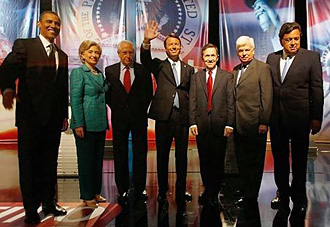 |
 |
 |
 Editorials | Issues | September 2007 Editorials | Issues | September 2007  
Little Democrat Difference on Immigration
 Perry Bacon Jr - Washington Post Perry Bacon Jr - Washington Post
go to original


| | Barack Obama, left, Hillary Clinton, Mike Gravel, John Edwards, Dennis Kucinich, Christopher Dodd and Bill Richardson. (Joe Raedle/Getty) |
Coral Gables, Fla. The first presidential forum to be conducted in Spanish placed a couple of the Democratic participants in an uncomfortable position Sunday night: answering tough questions while simultaneously fiddling to make sure their earpieces didn't fall out and they could hear the translation of the next question.

Those questions dealt with a range of issues of interest to Latino voters, from health-care policy to relations with Latin America.

Several questions focused on immigration, and the seven participants exhibited little difference on the issue, with all supporting reforms that would allow illegal immigrants now in the country to stay and eventually receive U.S. citizenship, and all criticizing anti-immigrant sentiments. Nearly all the candidates committed to overhauling immigration laws in their first year in office, days after Republican candidates had accused each other in a debate of supporting "amnesty."

"We all know that this has become a contentious political issue," said Sen. Hillary Rodham Clinton of New York. "It is being demagogued, and I believe that it is being used to bash immigrants, and that must stop. The Republican candidates need to understand that they are doing a great disservice to our country."

The most remarkable part of the 90-minute forum, held at the University of Miami, proved to be not the responses but the format: Questions were posed in Spanish by two moderators from the Spanish-language television network Univision, which broadcast the event nationally; interpreters immediately translated the questions into English for the candidates, while a written English translation was beamed onto a screen in the arena for the crowd of more than 3,000.

Univision required candidates to answer in English, because only New Mexico Gov. Bill Richardson and Sen. Christopher Dodd of Connecticut speak Spanish fluently. That prompted Richardson to criticize the network.

"I'm disappointed today that 43 million Latinos in this country for them not to hear one of their own speak Spanish, is unfortunate," Richardson said. "In other words, Univision is promoting English-only in this debate."

He then switched to Spanish but was cut off by moderators Jorge Ramos and Maria Elena Salinas.

Salinas and Ramos, meanwhile, delivered challenges of their own. Dodd, Clinton and Sen. Barack Obama of Illinois were called to account for their votes to build a fence on the U.S.-Mexican border.

All three noted their support for broader rights for Latino immigrants, both legal and illegal, but they said tighter border security was important. "That has to be part of comprehensive immigration reform," Clinton said, adding that in some points she supported "even a physical barrier."

Richardson called the fence "a horrendous example of misguided Washington policy."

"If you're going to build a 12-foot wall, you know what's going to happen," he said. "A lot of 13-foot ladders. This is a terrible symbol of America."

That seven of the eight Democratic candidates came to South Florida Sen. Joseph Biden of Delaware did not attend underscored the increasing importance of Latino voters in U.S. politics.

And the candidates were eager to connect their experiences with those of the Latino community.

Clinton noted that her campaign manager, Patti Solis Doyle, is a Latina, while Obama likened the work of labor activist Cesar Chavez to that of Martin Luther King Jr.

Former North Carolina Sen. John Edwards bragged that the small town he grew up in, Robbins, N.C., "is now half Latino." And Rep. Dennis Kucinich of Ohio said Spanish should become a second national language, a stance that Dodd and Richardson would not adopt.

Richardson, the only Latino running for president, was the most explicit he has ever been in this campaign in discussing his Mexican-American heritage, and in identifying himself with Latino issues.

"I am of the view that Latinos can make a difference in this presidential election," he said. "Forty-three million of us all around the country can decide not just what is best for Latinos but what is best for America."

Latinos make up the nation's largest minority group, with about 14 percent of Americans, but they represent only about 9 percent of the electorate because of lower citizenship and participation rates.

Still, their votes are coveted, in part because Latinos are regarded as a group still up for grabs between Democrats and Republicans, and also because their numbers are particularly strong in a number of states Democrats regard as must-wins, such as Florida, California and New York.

Clinton leads national polls of Latino voters by a wide margin, and she has gained the support of Latino politicians such as Sen. Robert Menendez, D-N.J.

But her Democratic rivals are aggressively courting other Latino leaders. Federico Peña, a Cabinet member in the Clinton administration, announced on the eve of the forum that he was backing Obama.

Univision had scheduled a forum for Republican candidates next week, but only Sen. John McCain, R-Ariz., said he would attend. Several other candidates cited scheduling conflicts.

Democrats see an opportunity to peel off Latino voters in 2008 because of the opposition of many leading Republicans, including almost all of the party's White House candidates, to President Bush's policy that would create a citizenship path for some illegal immigrants. | 
 | |
 |



